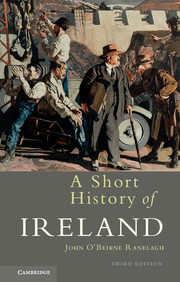Book contents
- Frontmatter
- Contents
- List of figures
- Preface to the first edition
- Preface to the second edition
- Preface to the updated edition
- Preface to the third edition
- Map of Ireland: The Pale and the Irish plantations
- Chapter 1 Beginnings
- Chapter 2 Ascendancy
- Chapter 3 Union
- Chapter 4 Home rule?
- Chapter 5 Rising
- Chapter 6 South
- Chapter 7 North
- Chapter 8 Another country
- Appendix Timeline of Irish history
- Select bibliography
- Index
Preface to the first edition
Published online by Cambridge University Press: 05 November 2012
- Frontmatter
- Contents
- List of figures
- Preface to the first edition
- Preface to the second edition
- Preface to the updated edition
- Preface to the third edition
- Map of Ireland: The Pale and the Irish plantations
- Chapter 1 Beginnings
- Chapter 2 Ascendancy
- Chapter 3 Union
- Chapter 4 Home rule?
- Chapter 5 Rising
- Chapter 6 South
- Chapter 7 North
- Chapter 8 Another country
- Appendix Timeline of Irish history
- Select bibliography
- Index
Summary
Preface to the first edition
Ireland’s history is distinguished by two special characteristics. First, a recognisable Irish nation, of course over time itself a conglomerate of many ‘nations’, distinct from a British nation, with its own language, customs and lore dating back to the Iron Age, survived right into the nineteenth century. This gave Irish nationalism a particular force. Second, over the centuries of increasingly powerful and centralised British government, ruling social and political pressures combined first to make Irish people feel and then to believe that they were inferior. This is one of the worst things that any nation or race can do to another. It results in the most terrible of paradoxes where in practical matters there is a desire equally to welcome and to oppose, thus ensuring that failure accompanies success, and despair and a sense of futility underlie the whole of life. As many Irishmen were government spies, agents and informers as were national heroes; emigration became almost the only way of escaping depression. To the present day many Irish writers find it somehow necessary to practise their art away from home.
In modern times the complexities of economic development, international arrangements and the rejection of Irish nationalism in Northern Ireland have begun to change traditional attitudes. The very concept of a unitary Irish nation has been challenged, and the reality of Ireland’s connections with Britain has begun to be faced honestly for the first time by politicians. In the last quarter of the twentieth century we can, I think, say that Ireland’s people are at last considering themselves in relation to an Irish world for which they themselves accept responsibility.
- Type
- Chapter
- Information
- A Short History of Ireland , pp. ix - xPublisher: Cambridge University PressPrint publication year: 2012



